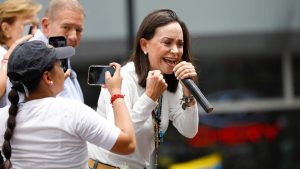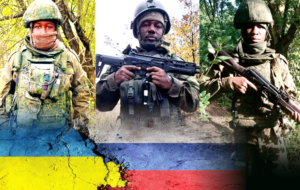Maria Corina Machado: From Hiding to History, as Venezuela’s Voice Wins the Nobel Peace Prize

In a rare moment of light for Venezuela’s fractured democracy, opposition leader María Corina Machado has been awarded the 2025 Nobel Peace Prize recognition, the committee said, for her “struggle to achieve a just and peaceful transition from dictatorship to democracy.”
![]()
![]()
Machado 58, an industrial engineer and mother of three, has spent much of the past year living in hiding, moving between safe houses under the shadow of President Nicolás Maduro’s security forces. Her disqualification from Venezuela’s 2024 presidential election was, for many, the moment democracy’s flickering flame seemed to fade entirely. Yet on Friday in Oslo, her defiance was honored as one of Latin America’s boldest acts of civic courage. “This is an immense recognition of the struggle of all Venezuelans. We are on the threshold of victory” – said Machado.
The Norwegian Nobel Committee praised her as a unifying figure in a historically divided opposition that inspired millions to demand free elections in a nation, long gripped by economic collapse and authoritarian rule. Chair Jørgen Watne Frydnes noted that Machado’s decision to remain in Venezuela, despite threats against her life, has inspired millions.
Machado’s journey from a business-trained reformer to the face of Venezuela’s resistance mirrors the country’s own decline, from the oil-rich promise of the Chávez era to the hunger and repression of Maduro’s rule. Once dismissed as part of the elite, she gradually became a vessel for public frustration, bridging middle-class professionals and impoverished voters seeking dignity and stability.
Her critics, however, view her as combative and ideologically rigid. Her open alignment with Washington and staunch support for Israel’s right-wing government have drawn ire from Latin America’s left and from some within her own ranks. She has vowed, if elected, to move Venezuela’s embassy from Tel Aviv to Jerusalem, a symbolic break from Caracas’s historic support of the Palestinian cause.
Still, for many Venezuelans, her politics are secondary to her persistence. When she was barred from the 2024 race, she backed fellow opposition candidate Edmundo González Urrutia, who international observers say likely won the vote before Maduro declared victory with 51 percent. The opposition’s leaked tallies showed González ahead by a wide margin. Protests followed. The crackdown was swift.
The aftermath of that disputed election plunged Venezuela deeper into turmoil. Security forces detained dozens of opposition activists. Internet blackouts silenced news outlets. Yet grassroots networks like teachers, nurses, church groups, etc., carried Machado’s message of – civil resistance with moral power. To those on the streets of Caracas, her Nobel Prize is both a vindication and reminder that global recognition may not translate into safety or reform.

![]()
United Nations Secretary-General António Guterres called the award a “tribute to all who defend democracy”. The Office of the High Commissioner for Human Rights said it reflected “the aspirations of Venezuelans for freedom and the rule of law”.
But politics intruded even in triumph. In Washington, President Donald Trump who had repeatedly declared himself deserving of the Nobel, lashed out at the committee. His spokesperson accused it of “placing politics over peace,” a statement that drew swift rebuke online.
Machado joins a lineage of laureates whose courage under repression reshaped their nations — from Iran’s Narges Mohammadi to Burma’s Aung San Suu Kyi and Poland’s Lech Wałęsa. Like them, her story fuses the personal and political: a mother who chose to stay when exile promised safety, and who now carries a nation’s fragile hopes on her shoulders.
The Nobel Peace Prize, which worth 11 million Swedish kronor (about $1.2 million), will be presented in Oslo on December 10, the anniversary of Alfred Nobel’s death. Whether Machado will be free to attend remains uncertain.
At the moment, her voice echoes from hiding not as a candidate, but as a symbol. “Peace is not silence, it is justice” – she wrote,








